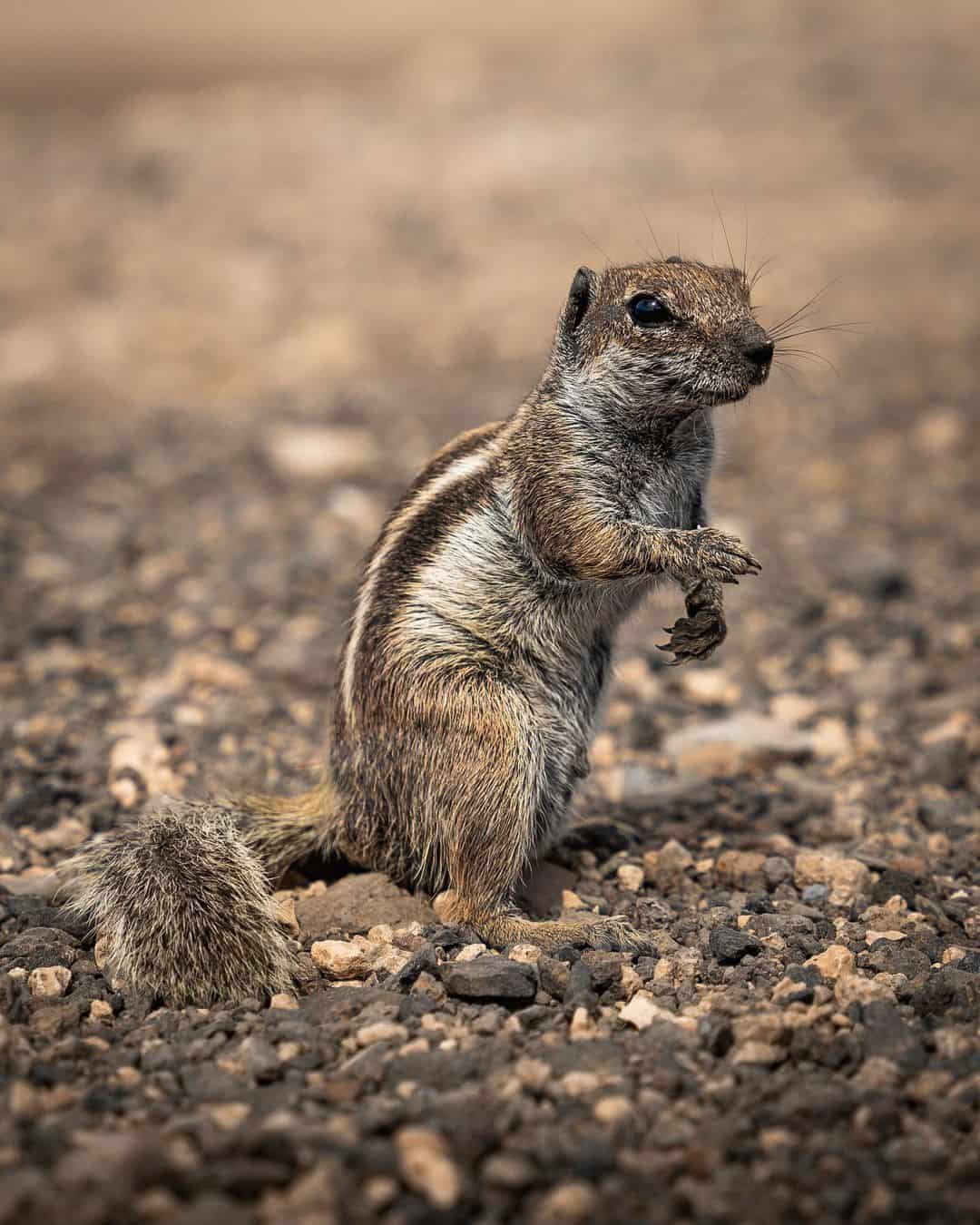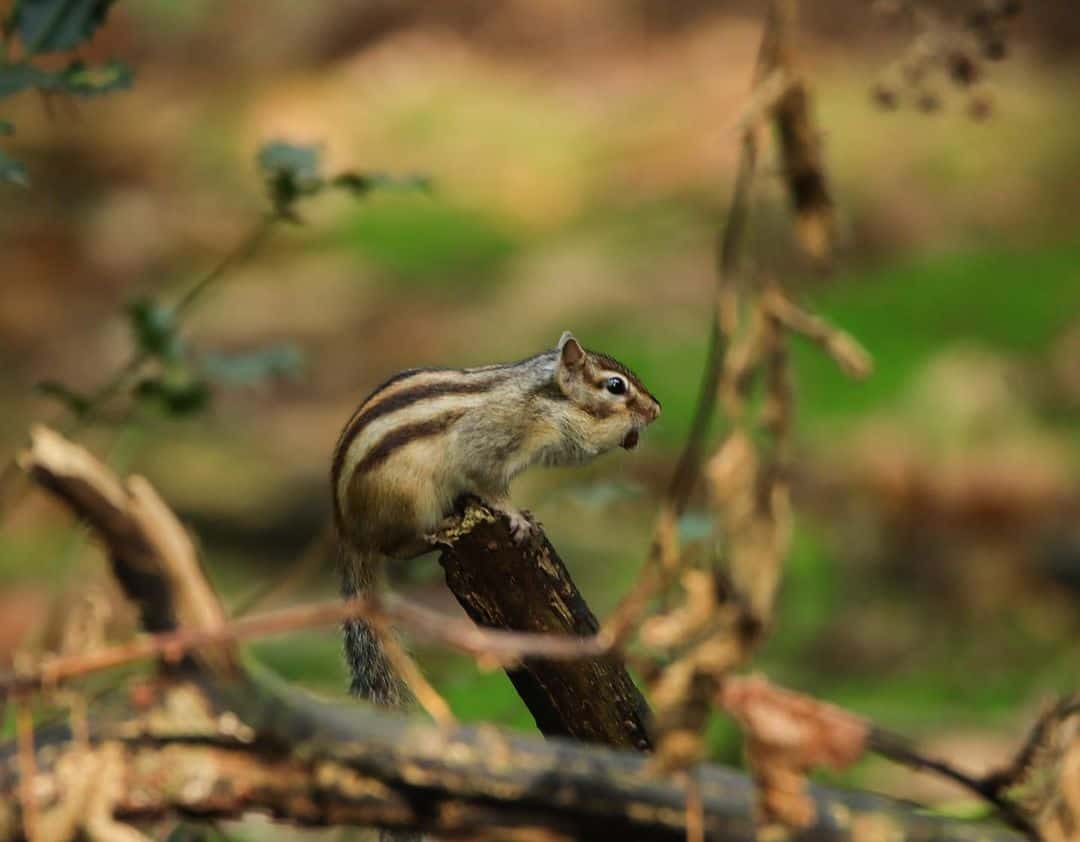What comes to your mind when someone mentions chipmunks? Alvin, Simon, and Theodore from Alvin and the Chipmunks, right?
Today, however, we will not focus on the career path of the Trio, but rather on how long they can live.
Furry, cute, and lively, chipmunks are small, ground-dwelling rodents from the Sciuridae family. They are close cousins with the Tree and Ground Squirrels.
They stand out due to their unique stripes and cheek pouches, used to store and transport foods.
These animals are native to North America and Mexico. And get their name from the “chip-chip” sound they make.
If you plan to pet or cage these little cuties, you must learn about their lifespan. This way, you can make an educated decision about their care and well-being. You will also understand their habitat parameters and behavior.
Read on to learn how long chipmunks live.
Average Lifespan of Chipmunks

The average lifespan of a chipmunk ranges between 2 – 5 years. But this depends on the chipmunk species, environmental conditions, and lifestyle factors.
In captivity, the lifespan of chipmunks is between 4 to 11 years. This is because of access to plenty of food, protection from predators, proper care, and improved living conditions.
Factors That Influence the Lifespan of Chipmunks
1. Genetics
Genetics plays an integral role in determining the lifespan of most species, and chipmunks are no different. These adorable rodents pass on their genes to their offspring, such as resistance to environmental stressors and susceptibility to diseases.
For instance, some species have a high genetic inclination towards specific health problems, like respiratory infections, which might reduce their lifespans.
On the other hand, some chipmunks might have superior traits, like resistance to harsh environmental conditions or robust immune systems that boost their lifespan.
The bottom line is that inherited traits are the building blocks for the chipmunks’ overall health and well-being. This translates to a longer life.
2. Predators
Another factor that affects the lifespan of the Chipmunks is predator activity. Most chipmunks rarely survive for an entire year because of predator attacks.
In most cases, Chipmunks fend for themselves two months after birth. These independent chipmunks easily fall prey to several predators, including foxes, bobcats, coyotes, owls, hawks, raccoons, weasels, dogs, snakes, and even their cousins, the red squirrels.
Despite falling prey to predators, chipmunks have developed many forms of defense. These include running away, changing their activities in response to alarm signals, and staying in their burrows.
Besides, these cuties have unique communication systems to caution others of incoming predators. Chipmunks that escape successfully from predators usually live for a long time.
3. Environment Conditions
The habitat of a chipmunk also influences its lifespan. During winter, most chipmunk species stay in their burrows and enter a hibernation-like state of torpor. But the state is not considered true hibernation since the chipmunks wake up every week to eat stored food and get rid of waste.
However, harsh winters can take a toll on chipmunks, as they reduce their stored food reserves. In fact, severe weather put a lot of stress on chipmunks and reduces their lifespan.
Conversely, chipmunks thrive for several years in comfortable and well-protected environments.
4. Lifestyle Factors
As for lifestyle, factors like diet, exercise levels, and environment come to play. In the wild, chipmunks consume a diet rich in nutrients and vitamins that help improve their health and boost their lifespan.
Their diet often comprises seeds, berries, and nuts. But sometimes, it’s supplemented with insects, small birds, earthworms, slugs, bird eggs, snails, and frogs.
If chipmunks consume sugar and unhealthy fats (usually found in human food like bread and potato chips), they can develop obesity and other health conditions that reduce their lifespan. This is quite common in chipmunks that reside in urban areas.
In captivity, exercise is necessary since chipmunks have access to plenty of food. Without exercise, these creatures can develop heart conditions, obesity, and other issues that can shorten their lifespan.
Exercise helps to regulate the animals’ weight and boosts their cardiovascular system while improving bone density.
The chipmunk’s environment also determines its lifespan. Chipmunks in polluted areas or those exposed to high-stress levels are less likely to live for several years.
Contrary to this, chipmunks in pollutant-free regions have a lot of opportunities to play and exercise and a high chance to survive for several years.
5. Diseases
How healthy a chipmunk is can determine its lifespan. These members of the squirrel family are prone to several diseases, including upper respiratory infections, skin disease, cheek pouch illness, dental issues, heart disease, bone issues, and obesity.
They can also suffer from metabolic bone conditions, especially if they consume seeds and nuts high in phosphorus and low in calcium. Symptoms of this disease include loss of appetite and bone fractures. In most cases, this condition is hard to address.
In essence, Chipmunks susceptible to these conditions often have a shorter lifespan unless they get treated immediately.
The Lifespan of Different Chipmunks Species
There are at least 25 species of chipmunks spread throughout North America, Canada, and Mexico. However, one species originates from Asia and dominates most regions of China, Japan, and Central Russia. The lifespan of these animals varies from one species to another, as you will see below.
1. Eastern Chipmunk (Tamias striatus)

The Eastern chipmunks are arguably the most popular chipmunk species. They are widely distributed throughout southeast Canada and the eastern United States. They stand out from the other species because of their reddish-brown fur and white stripes running horizontally down their back.
Most eastern chipmunks live for less than 2 years in the wild. But those who survive predators, diseases, and harsh conditions can live a maximum of 8 years. The same applies to chipmunks held in captivity.
2. Siberian Chipmunk (Tamias sibiricus)

Native to northern Asia, the Siberian chipmunk thrives on forest floors where there is plenty of ground cover, in human structures, and among rocky extensions.
Unlike the Eastern Chipmunks, they have yellow to brown fur on the back (along with 5 dark and 4 white stripes) and white fur on the belly and chest.
Siberian chipmunks can live anywhere from 2 years to 5 years in the wild. But when held in captivity, they can live up to 10 years.
Besides that, both males and females reach sexual maturity at 9 months. These species start breeding in the second half of April to June. After a pregnancy duration (gestation period) of 28 to 35 days, the female chipmunk gives birth to a litter of 3 to 8 offspring.
3. Townsend’s Chipmunk (Tamias townsendii)

Named after John Kirk Townsend, this chipmunk species has a reddish-brown coat with lighter stripes on their faces and back.
They live mostly in thick forests of pine trees and hardwoods and along the edges of streams, rivers, and lakes. These creatures also love habitats with lots of shrubs.
Townsend’s chipmunks are popular for their ability to climb and move quickly. They are also fairly large compared to other chipmunk species.
As for lifespan, these species can live for a long time. The chipmunks can live for a maximum of 2 to 7 years in the wild, and 9.3 years in captivity. However, their average lifespan is 5 years.
Another interesting fact is that Townsend’s chipmunks can differentiate between kin and non-kin. And thanks to this ability, they can promote optimal outbreeding.
4. Least Chipmunk (Tamias minimus)

Unlike Townsend’s Chipmunk, the Least Chipmunk is considerably small. However, it’s one of the fastest species.
Generally, these chipmunks are solitary creatures that only socialize during mating season (from April throughout August to October) and raise their litter. Additionally, they are highly territorial and often defend their nest against intruders.
The information about the Least Chipmunk lifespan has not yet been recorded. But is believed the chipmunk has a shorter lifespan than the Eastern Chipmunk–typically 2 to 3 years.
Another unique thing about this chipmunk is that it constructs its nest depending on the season of the year. In summer, the nest consists of barks and leaves and is usually located in tree cavities. During winter, the chipmunk builds its nest using feathers, tree bark, fur, and other soft material.
Can You Extend Chipmunk Lifespan?
Are you planning to keep a chipmunk as a pet? There are several things you can do to prevent your pet from dying soon.
1. Well-balanced diet
While you might get tempted to give your furry friend sweets, chips, and other human food, it’s not recommended. Such foods offer zero nutritional value and increase the risk of obesity and heart problems. Provide your pet with a varied diet, such as fruits, mushrooms, vegetables, seeds, and nuts. A proper diet will boost your pet’s health and increase its lifespan.
2. Adequate Shelter
Ensure your Chipmunk’s environment is safe and comfortable. Build a shelter that will protect the animal from harsh weather and keep predators out. Like a well-balanced diet, a pleasant shelter will reduce your friend’s stress levels, promoting a healthy and long life.
3. Regular Exercise
Chipmunks are active and playful creatures. They constantly climb trees and bushes and forage. As such, ensure your home environment allows them to replicate these behaviors so they can stay healthy and happy.
4. Vet Visits
Like any pet, chipmunks require regular visits to the vet for vaccinations and checkups. Preventive care measure allows for disease detection and prevention, which can contribute to a longer lifespan.
Closing Thoughts
As we wrap up, Chipmunks have an average lifespan of 2 to 5 years. Some species, like the Siberian and Townsend’s chipmunk, can live up to 9 to 11.3 years. However, factors like diseases, predators, and genetics can affect the chipmunk’s lifespan.
Sure! We cannot control this animal’s lifespan entirely. But we can take a few steps to improve their health and overall well-being and help them live stress-free for a long time.
If you own or plan to get a chipmunk, prioritize his health and happiness to ensure he (or she) has a long life. That means providing him with a proper diet, a favorable environment, and preventive care.
